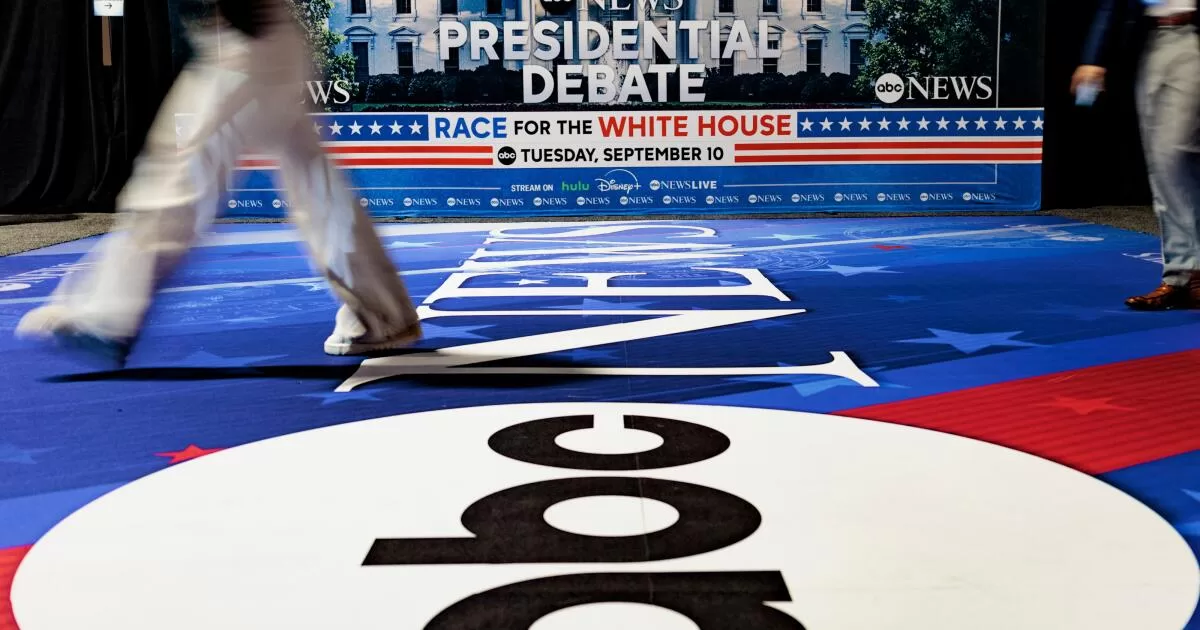President Obama liked to say that “elections have consequences.” He might have added the same about presidential debates.
That’s seldom felt more true than today, 51 days after President Biden’s foggy, faltering debate performance against former President Trump helped end the incumbent’s bid for a second term.
Trump and Vice President Kamala Harris prepare to meet for the first and potentially only time at 6 p.m. PDT Tuesday, in a debate that could again change the course of what has been an excruciatingly close contest.
The stakes of the 90-minute debate, at the National Constitution Center in Philadelphia, appear even greater than in past elections in the television era, in which the candidates typically agreed to at least two — and usually three — debates in the general election.
The showdown will be broadcast by ABC News and several other outlets, with ABC anchors David Muir and Linsey Davis moderating.
Whether the past is prologue, and what the past even means, will animate the contest.
Harris, 59, is expected to depict Trump’s four years in office as a time of turmoil, divisiveness (particularly toward immigrants) and constraint of personal freedoms — most notably a woman’s once-constitutionally-protected right to have an abortion.
Trump, 78, has argued that that his four years as chief executive were a halcyon time in America, when both unemployment and inflation were low and foreign wars had not exploded, siphoning billions of dollars away from the U.S.
The tables will reverse when it comes to assessing the era from 2021 until the present, when Biden and Harris have occupied the White House.
Trump will depict the last four years as a time of chaos and uncertainty, with inflation spiraling upward during the first years of the Democrats’ tenure and unauthorized crossings at the U.S.-Mexico border also spiking.
Expect the Republican nominee to borrow a line from a GOP predecessor, Ronald Reagan. In the second of two debates with President Carter, just one week before election day in 1980, Reagan faced the camera and asked Americans if they felt “better off” than they did four years earlier.
Harris supporters expect her to walk a challenging line — simultaneously touting accomplishments of the last four years and suggesting that as president she will be in a better position to respond on two issues many voters say are top-of-mind: economic distress and immigration.
In making that case, the vice president almost certainly will talk about the Democratic initiatives to bring down the prices of drugs, particularly insulin, and other pocketbook policies — like forgiving debt on student loans.
Trump and his advisors have tried to tie Harris to all of Biden’s shortcomings; going so far as to suggest that the vice president has been the shadow power running the Democratic administration. Harris can be expected to counter that she was in the room for important discussions, but not the one making the final decisions.
If Trump pushes hard in that direction, the vice president might counter: Was Vice President Mike Pence the real power in the Trump White House?
The candidates’ many differences include the way they have prepared for the debate. Harris hunkered down in Pittsburgh beginning late last week and went through formal preparation, with mock questions and answers.
Democratic operative Philippe Reines, a longtime Hillary Clinton aide, portrayed Trump in the run-throughs.
“We should be prepared for the fact that he is not burdened by telling the truth,” Harris said in a radio interview for the “Rickey Smiley Morning Show.” “He tends to fight for himself, not for the American people, and I think that’s going to come out during the course of the debate.”
Trump said in an interview with his friend Fox News host Sean Hannity that he had no particular strategy and would “sort of feel it out as the debate’s taking place.” Trump quoted former heavyweight champion Mike Tyson: “Everybody has a plan until they get punched in the face.”
True to form, Trump has been complaining that he won’t be treated fairly by the ABC anchors. He has belittled the network, suggesting it’s a tool of the Democratic Party. Before the June 27 debate with Biden, he launched a similar preemptive strike, chiding CNN as “fake news” and moderators Jake Tapper and Dana Bash as biased.
But after Biden stumbled, Trump’s handlers opted to keep the focus on the incumbent, saying that CNN and its hosts had been fair. It was Biden’s team that groused — saying Bash and Tapper should have called out the former president for his many lies.
Trump’s falsehoods in the June debate included his unsubstantiated claim that Biden had directed the criminal prosecutions against him and his assertion — debunked in multiple polls — that the American people wanted Roe vs. Wade overturned so the states could set abortion policy.
CNN’s hosts left it almost entirely to the candidates to call out each other’s falsehoods in June. No one knows whether ABC’s Muir and Davis will intervene, or let the vice president and former president perform their own truth-squadding.
The Associated Press contributed to this report.
